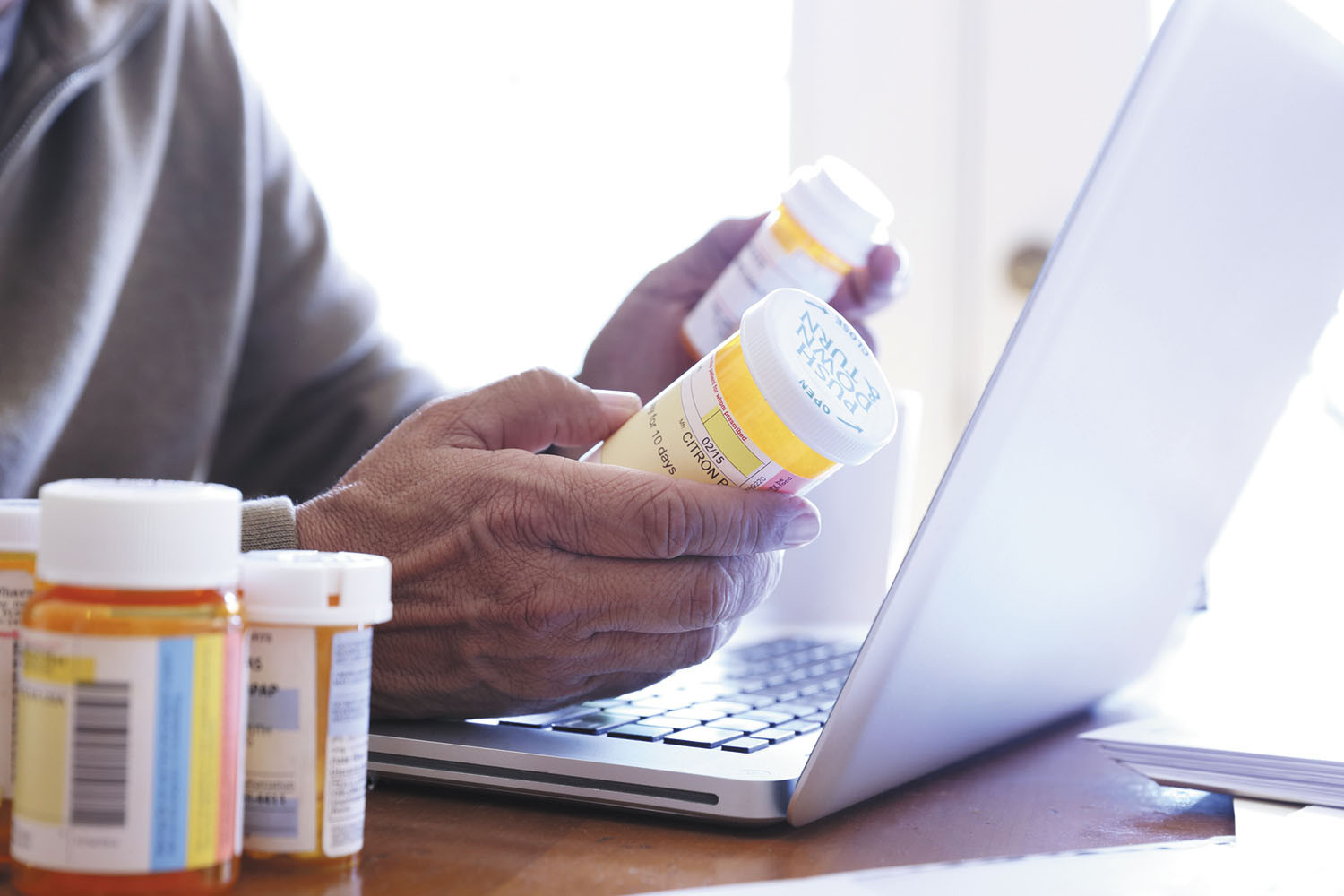
Counting steps is good — is combining steps and heart rate better?

Appendix pain: Could it be appendicitis?

Can saw palmetto treat an enlarged prostate?

How does Ozempic work? Understanding GLP-1s for diabetes, weight loss, and beyond

Zinc: What it does for the body, and the best food sources

Respiratory health harms often follow flooding: Taking these steps can help

Tips to leverage neuroplasticity to maintain cognitive fitness as you age

Can white noise really help you sleep better?

Celiac disease: Exploring four myths

What is prostatitis and how is it treated?
Staying Healthy Archive
Articles
Can a gluten-free diet help my skin?
Ask the doctors
Image: © fcafotodigital/Getty Images
Q. I have terrible skin, and a friend recently recommended that I eliminate gluten from my diet to help manage my condition. Will this work?
A. Not necessarily. Gluten has gotten a lot of attention in recent years. Some people believe that eating gluten can inflame the skin and, therefore, cutting it out will help relieve red, inflamed skin or other skin conditions, such as psoriasis or eczema.
Don’t let winter put a chill on your vegetable intake
It may take a little more effort, but some simple strategies can help you meet your recommended intake of veggies in the colder months.
Image: © stargatechris/Getty Images
In the summer, vegetables are plentiful. The supermarket shelves — and maybe even your own garden — are overflowing with zucchini and squash, tomatoes and asparagus. But as we head into the colder winter months, the offerings may be a little less inspiring.
"With summer vegetables becoming more expensive in the winter, people's eating variety may shrink," says Teresa Fung, adjunct professor in the Department of Nutrition at the Harvard T.H. Chan School of Public Health. "And when variety shrinks, often quantity shrinks as well."
Both high-carb and low-carb diets may be harmful to health
Research we're watching
Image: © AndreyPopov/Getty Images
The best dietary strategy when it comes to carbohydrate intake could be neither high-carb nor low-carb, but rather moderation. A study published online August 16 by The Lancet Public Health found that both high- and low-carbohydrate diets were associated with earlier death. But people who got about half to 55% of their calories from carbohydrates — which is considered a moderate amount — lived longer.
The research involved more than 15,000 adults ages 45 to 65 who were involved in the Atherosclerosis Risk in Communities study. Participants filled out a dietary questionnaire when they enrolled in the study, which began in 1987. Researchers then looked for links between what participants ate and their death from any cause over a median follow-up period of 25 years.
Straight talk on 9 popular foot products
For some body parts, the drugstore has little to offer. Not so for the feet. You'll almost always find several shelves of products for the pedal extremities. We asked Dr. James P. Ioli, assistant professor of orthopedic surgery at Harvard Medical School and faculty editor of the Harvard report Healthy Feet, to accompany us on a trip to a drugstore near our offices. Here is a list of some of the foot products we saw there, along with Dr. Ioli's comments.
- Arch bandage. Might make the arch feel better and more supported, but it isn't going to change the structure of the arch or fix serious problems. As the package says, people with diabetes or poor circulation should avoid these because they could reduce blood flow through the foot.
- Callus and corn cushions. Simple and effective. The donut shape keeps pressure off calluses (which usually form on the bottom of the feet) and corns (which form on the top, often on toes). Change them often; otherwise the skin underneath will start to break down. Well-fitting shoes often reduce the skin irritation that causes calluses and corns in the first place.
- Callus and corn removers. Stay away from them. The active ingredient, salicylic acid, can harm the healthy skin around the corn or callus.
- Detoxifying foot pads. They claim to absorb impurities from the body and aid "natural cleansing." In a word — bunk! The Federal Trade Commission filed a complaint against the makers of Kinoki foot pads in 2009. The best way to naturally cleanse your feet is by washing them with a little soap and water.
- Foot files. Okay, but use with care. People scrape and scrape and start to bleed. Old-fashioned pumice stone is a more gentle way of removing dead skin from the heels and balls of the feet.
- Foot powders. Better than many sprays. Foot powders can help with sweaty and smelly feet. Some brands contain menthol, which creates a pleasant sensation and smell (if you like menthol). Others have an antifungal medication.
- Moleskin. These products are cotton flannel with an adhesive backing, not actual moleskin. Good for reducing friction points in shoes caused by bunions, calluses, or corns. If you're using a lot of moleskin, though, it's time to consider switching to more flexible, better-fitting shoes.
- Orthotics. Nonprescription orthotics are worth a try before considering the prescription ones, which cost a lot ($300–$500) and usually aren't covered by insurance. The flat, foam, and gel orthotics cushion the foot nicely — not a bad thing. But if you overpronate or have arch problems, buy a pair with arch support. There's some limited evidence that orthotics can also help with bad knees and backs, but don't buy them expecting those problems to go away.
- Toe exercisers. Billed as yoga for the toes. If these make you feel better — sure, why not. But don't expect the minor miracles (restoration of foot health, increased circulation, relief of stress and tension in feet and legs) promised on the package and in late-night TV ads. Investing what you'd spend on toe exercisers on new shoes might be a better use of your money.
Keeping bones strong
Ounce for ounce, bone bears as much weight as reinforced concrete. However, unlike reinforced concrete, bone is a living tissue. It serves as a repository of minerals for the rest of the body to use, continuously lending them out and replacing them. Bone also gets stronger when "stressed" by physical activity, and can repair itself when injured.
The building and tearing down of bone tissue is called remodeling. This process happens continuously throughout your entire life. At first, your body rebuilds more bone than it demolishes. Typically, a person reaches peak bone mass around the age of 30. Among women, bone mass usually remains steady for the next 20 years or so until the onset of menopause, when bone is lost much more quickly than it is replaced. When bone loss is significant, the result is osteoporosis (which means "porous bone"). Bone loss generally starts later for men — typically in the late 50s — and progresses more slowly than in women. But men can also get osteoporosis.
Tips for success when your kids are on your health care team
Be upfront about your needs, and set your own ground rules.
Image: © SelectStock/Getty Images
Allowing your kids to be involved in your health care can have many benefits. The arrangement provides advocates who can help you follow your treatment plan, talk to your doctors, and maybe even make appointments and take you to them. As an added bonus, you get to spend more time with your adult children.
But the arrangement isn't always easy. "There's a tendency for roles to reverse. The child becomes the parent. The parent may not be comfortable with that. Or the parent doesn't want to burden the child, and lets health issues go until they're too far gone," says Dr. Suzanne Salamon, associate chief of gerontology at Harvard-affiliated Beth Israel Deaconess Medical Center. Consider the following tips to navigate the relationship.
Do urgent care clinics overprescribe antibiotics?
News briefs
Image: © AlexRaths/Getty Images
Urgent care clinics are convenient when you don't feel well and can't see your doctor right away. But a study published online July 16, 2018, by JAMA Internal Medicine found that people who go to such clinics may be more likely to be given prescriptions for unnecessary antibiotics. Researchers analyzed 156 million insurance claims from 2014 and found that 46% of people treated at urgent care centers for viral conditions — like a bad cold, the flu, or viral bronchitis — were prescribed antibiotics. The problem: antibiotics kill only bacteria, not viruses. The study underscores the need to ask health care workers if you have a viral or a bacterial condition before you take antibiotics.
Scam targets people buying medicine online
News briefs
Image: © DNY59/Getty Images
If you've tried to buy medications by phone or on the Internet but received an FDA warning letter instead, beware. The FDA warns that criminals are forging these notes, possibly with the goal of later getting your money. The letters look official, like they're from the FDA or the Federal Trade Commission, and they claim that the FDA has identified drug violations based on a review of your parcel and social media accounts. Don't be fooled. The FDA doesn't send letters to consumers. So why are you getting one? The FDA says it may be because you're contacting an illegal online pharmacy. "Many of these illegal websites appear legitimate, and it can be hard to tell the difference," notes FDA Commissioner Scott Gottlieb. They may try to sell your personal information or charge you for products you never ordered. And scams aren't the only risks. Illegal pharmacies typically sell counterfeit — and unsafe — medicines. If you believe you've received a fake warning letter, email the FDA at FDAInternetPharmacyTaskForce-CDER@fda.hhs.gov. Send information about the letter or a scan or photo of the document.

Counting steps is good — is combining steps and heart rate better?

Appendix pain: Could it be appendicitis?

Can saw palmetto treat an enlarged prostate?

How does Ozempic work? Understanding GLP-1s for diabetes, weight loss, and beyond

Zinc: What it does for the body, and the best food sources

Respiratory health harms often follow flooding: Taking these steps can help

Tips to leverage neuroplasticity to maintain cognitive fitness as you age

Can white noise really help you sleep better?

Celiac disease: Exploring four myths

What is prostatitis and how is it treated?
Free Healthbeat Signup
Get the latest in health news delivered to your inbox!
Sign Up











